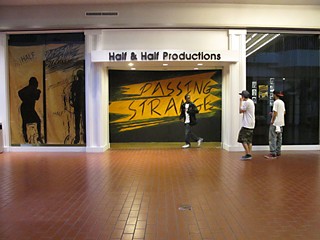Passing Strange
Half & Half Productions' debut about a young black man's journey of self-discovery was hampered by its mall storefront location
Reviewed by Matthew Irwin, Fri., May 17, 2013

Passing Strange
Highland Mall, 6001 Airport #1020May 11
Samuel Clemens' wife often dismissed her husband's frequent diversions with a sigh. "Ah, youth," Olivia would say. Oh, how that phrase must have stung. Imagination, that winsome childlike enthusiasm, is both the artist's greatest collaborator and his most distracting playmate.
On the other hand, an undernourished imagination is a self-indulgent nuisance to everyone. Such might be the case with Youth, the main character in Passing Strange, the Tony Award-winning rock opera recently staged by Austin's newest theatre company, Half & Half Productions.
Half & Half has taken over a storefront in Highland Mall, which company founders Scott Tatum and Julianna Wright would like to make their permanent theatre. They've initiated a crowdfunding campaign on Indiegogo, a less strict version of Kickstarter, to set the first layers of cement.
This is worth noting, in part, because young theatre companies have always repurposed spaces forsaken in the wake of economic growth. The move from abandoned warehouses to emptied storefronts at once reminds us of the change in the country's economic activity and possibly foretells the demise of our current activities.
The space is also significant, because it still feels like a store. In fact, before the production began, three youths walked into the space, thinking it was a new store and immediately exited saying, "It's a party or something."
Were Passing Strange a piece that spoke to the space – as a room in a mall full of vacant storefronts, perhaps – the space would have been less distracting. But Passing Strange is a piece about theatre and artistic process that deserves a proper delineation between audience and actors, so that when the characters break that fourth wall, we clearly see that they're inviting us to participate on a metaphysical level.
The problem of the space isn't unworkable – more dark curtains (or paint) for the brightly colored walls and better sound would help tremendously – but I found it entirely too distracting to my willing suspension of disbelief, like trying to be transported by a favorite band playing in an airport hangar (you know what movie I'm talking about).
Had I felt more involved with the show, I may have been able to use more of these 450 words to laud the remarkable talents of the cast, particularly Vincent Hooper as Youth and Brian Ridley, who played multiple characters. I may have written about how the play speaks to Half & Half's mission to "disrupt a discourse that relies upon outdated understandings," in this case, of blackness. And I certainly would have described how Youth simultaneously irritated me, because I saw my own childish self-indulgence in him, and encouraged me, by demonstrating that the road to understanding everything's all right is paved by the understanding that it's not.
Youth is about this journey.












